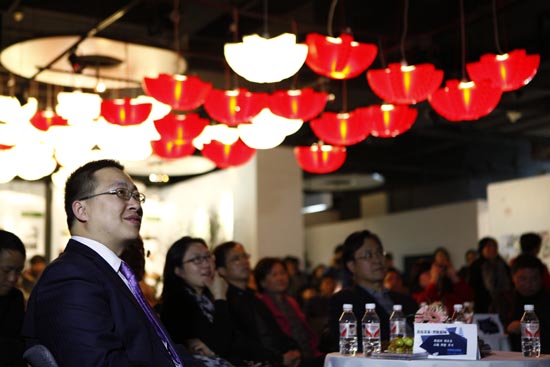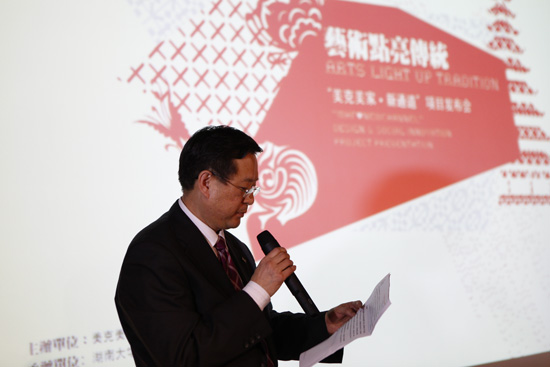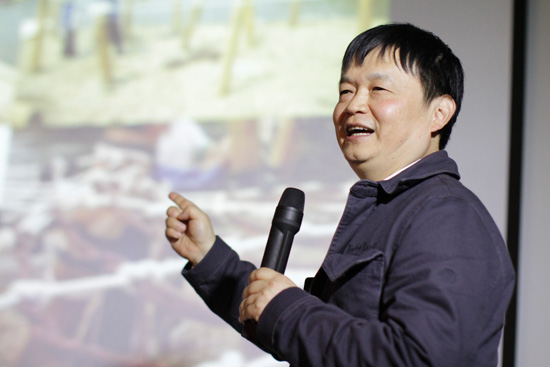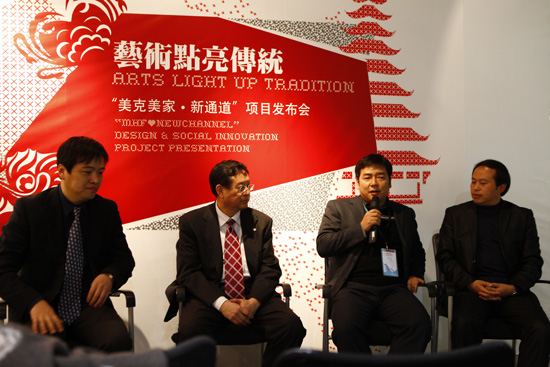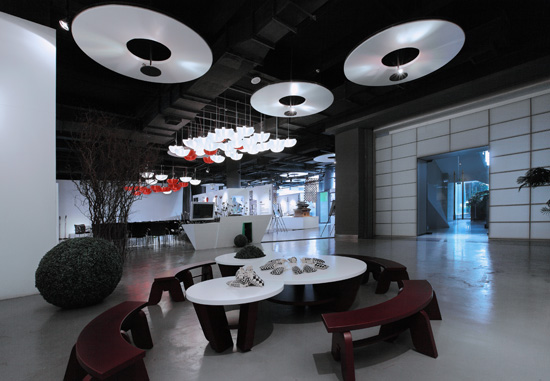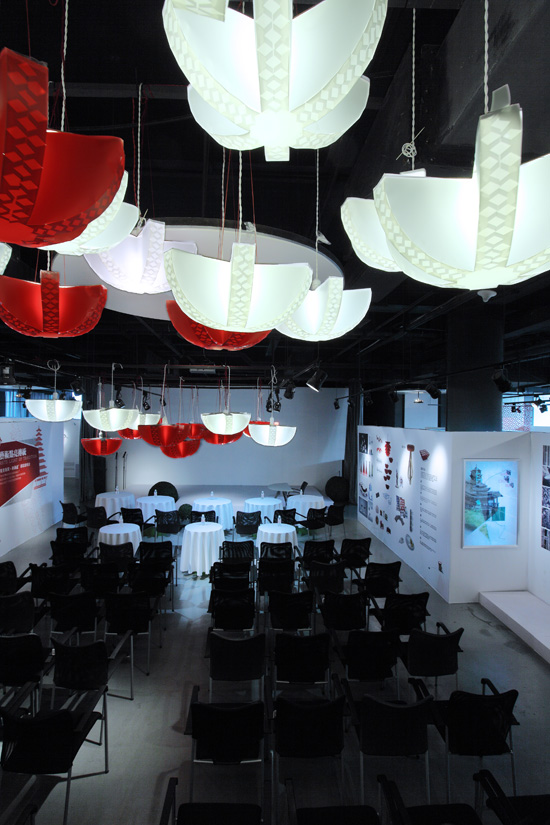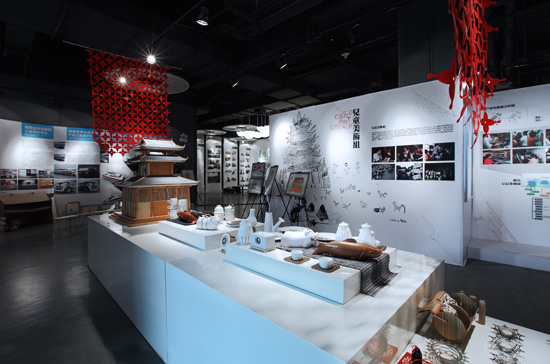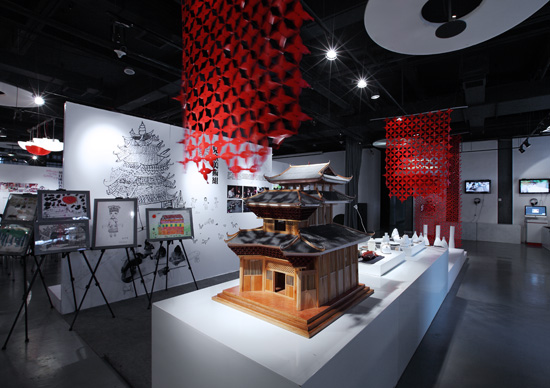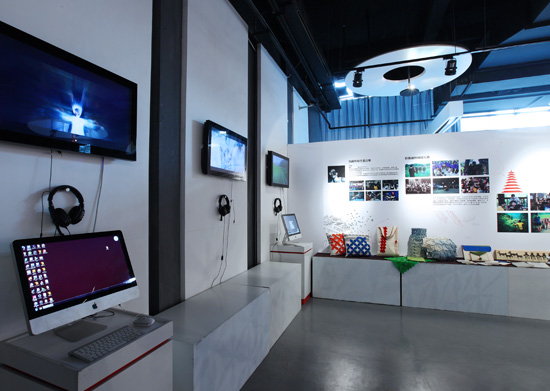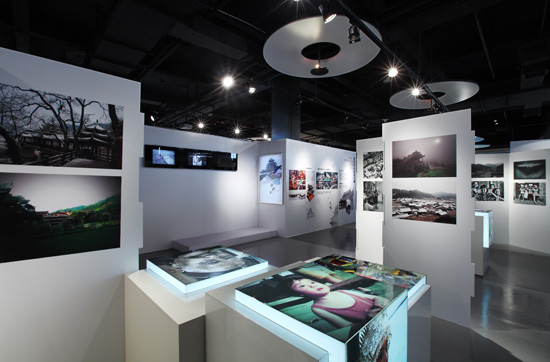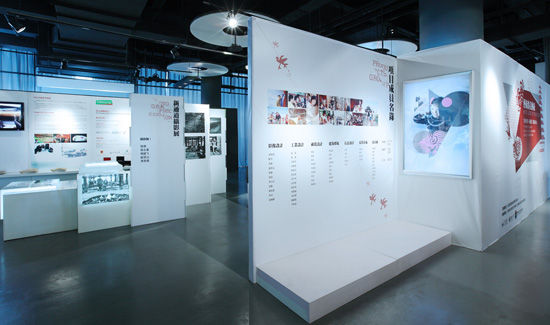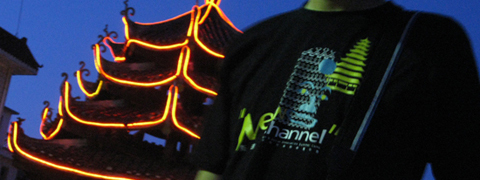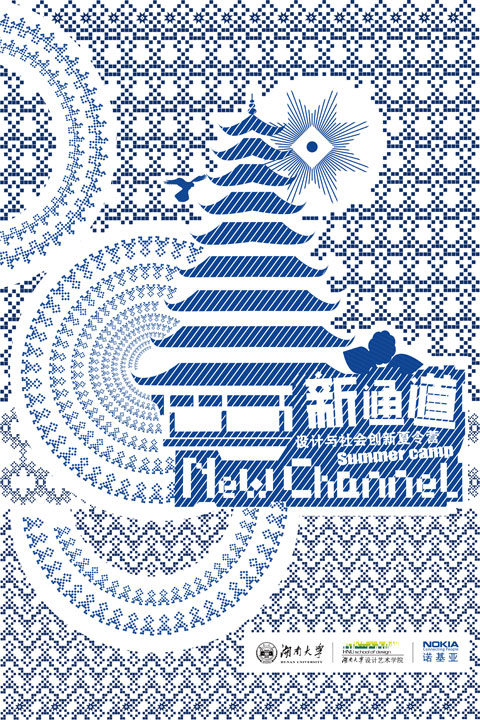/ New Channel
“新通道”设计与社会创新夏令营成果展启动仪式成功开幕
十二月 , 14th , 2011 -- 5 : 55 下午2011年12月1日,主题为“艺术点亮传统,设计改造生活”的“新通道”设计与社会创新夏令营成果发布会暨成果展启动仪式在湖南省工业设计平台成功举办。活动的现场展示了湖南大学学生在老师和设计师的指导下、经过“新通道”设计与社会创新夏令营的学习和采风后带来的通道儿童画作、摄影作品、侗族特色手工艺设计产品、影像、音乐等成果,吸引了来自全国的二十余家媒体和社会各界人士的广泛关注。活动主办方还特地从湖南省通道县请来当地有名的民间艺人表演原汁原味的侗族芦笙音乐和侗族歌舞,把现场来宾带入一个原生态的侗族风情地。
发布会现场
通道县侗族民间艺人
此次成果发布会由美克美家家居连锁有限公司和湖南大学主办,来自湖南省科技厅、湖南省旅游局、湖南省教育厅、湖南省民委、湖南省通道县、坪坦乡和横岭村的有关领导均到场参加并做主题发言。
美克美家副总经理戴建国致辞
湖南大学设计艺术学院何人可教授进行项目介绍
通道县副县长向付和致辞
发布会共分五个环节。首先由美克美家家居连锁有限公司的领导致辞,并通过宣传片向在场的嘉宾展示美克美家作为大型企业所承担的社会责任和继续推广社会公益项目的决心。湖南大学设计艺术学院院长何人可教授为来宾们介绍了“新通道”设计与社会创新夏令营的主要内容、成果,以及从中总结的基于社区和网络的设计与社会创新的工作方法。第三个环节是整场发布会的重头戏,夏令营影像组的同学们呈现了三段“新通道”的宣传纪录片,包括整体项目介绍、侗族剪纸印象和对支离破碎的侗族文化的抽象表达等,集中展现了侗族的传统文化之美以及学生们从设计的角度对侗族文化的领悟。第四个环节是嘉宾们自由参观展区展品,由参加夏令营的师生在各个展区向大家介绍展品的来历和功能。最后,美克美家的领导和湖南大学设计艺术学院的教授们接受了媒体专访,畅谈此次夏令营的心得和成果,并表示将来有机会会将该项目继续深入下去。
项目相关领导接受媒体专访
“新通道”设计与社会创新项目是湖南大学设计艺术学院进行可持续设计研究的重点之一。项目针对通道这样一个具备“独特的自然生态环境与丰富的非物质文化遗产”但经济发展落后的少数民族地区,整合不同专业和学科的优势,通过非物质文化遗产保护、工业设计、景观与家居设计等综合的工作方法,建立一个国际化的设计创新联盟和基于网络的信息平台,参与式的促进当地居民的文化自主意识和产业创新,让设计以一种更有张力的结构形式和社会认同力量参与到各种社区的社会创新中,使得基于网络的可持续的和谐社区成为可能。三年间,设计艺术学院的教授和学生们先后联合诺基亚研究院和美克美家开展了两届设计与社会创新夏令营,深入通道县平坦乡,体验当地生活,进行文化采风,并就地开展设计实践。
此次夏令营共组织了来自工业设计、建筑、景观、规划、环保、信息、影像等40人的专业团队,分成美术、影像、社会学研究组,环境、景观家居设计组,工业设计组,信息设计组和视觉设计组五个小组分别展开活动。夏令营的成果包括:组织当地70多名留守儿童参加美术培训班,创作儿童画800多幅,并为美术班举办小型美术展;采集与民风和传统文化相关的影像资料,制作侗族文化宣传纪录片十余条;提炼侗族文化精髓,设计带有侗族传统文化背景的产品60件;为通道居民设计样板房,为三个乡镇的人民搭建亲水平台;为通道设计网站推广通道的文化和旅游产业,并提供留守家庭成员与外出务工人员交流沟通的平台,目前网站已经投入使用(http://www.mypingtan.com/)。
湖南大学设计艺术学院的师生们表示,这次发布会还远远不是结束,未来将会展开更多的社会创新研究和实践,让贫困地区少数民族人民从中受益,真正体现设计的社会力量。据悉,成果展将持续一个月,欢迎有兴趣的各界人士前往参观。
“美克美家•新通道”项目成果发布会
十一月 , 28th , 2011 -- 5 : 59 下午由美克美家与湖南大学、湖南省工业设计创新平台共同举办的“艺术点亮传统”美克美家•新通道项目发布会将于12月1日在长沙隆重召开。届时,将发布项目合作计划并首次对外展示第一期项目成果,来自全国的20余家主流媒体将共同见证活动盛况。
“美克美家•新通道”项目促进了美克美家由关注当代艺术教育扩展到对传统艺术的传承与保护,开启了“艺术•家”项目成长与发展的新篇章。此次美克美家与湖南大学“新通道”项目合作,共同关注侗族非物质文化遗产的保护与传承,培养了青年学生的社会责任感,也为青年设计师提供了参与社会创新和公益工作的平台。
湖南大学设计艺术学院在湖南省工业设计创新平台的支持下,除了通过发展核心产业的工业设计创新推动湖南省的新型工业化进程,也对地域与非物质文化保护、地方产业振兴、社会认同与文化创新等问题投入了极大的关注并取得丰硕成果。本项目针对通道这样一个具备“独特的自然生态环境与丰富的非物质文化遗产”但经济发展落后的少数民族地区,整合不同专业和学科的优势,通过非物质文化遗产保护、工业设计、景观与家居设计等综合的工作方法,建立一个国际化的设计创新联盟和基于网络的信息平台,参与式的促进当地居民的文化自主意识和产业创新,使得设计以一种更有张力的结构形式和社会认同力量(创新网络、设计网络、社会网络等)参与到各种社区的社会创新中,使得基于网络的可持续的和谐社区成为可能。
本次发布会将见证美克美家和湖南大学意义深远的合作,通过关注那些即将被遗忘的文化遗产,用艺术之光保护传统文化生态。
‘Serving the people’ the Swiss way
六月 , 11th , 2010 -- 2 : 04 下午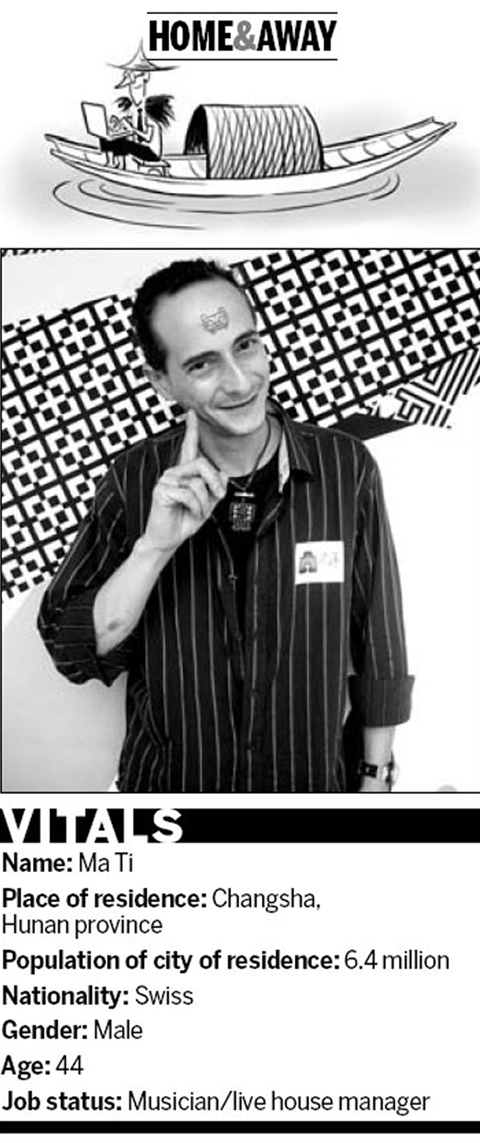
传播设计实验室音乐顾问接受China Daily采访
EDITOR’s Note:
“Home & Away” is a section about life experiences of expats living outside of central Chinese cities like Beijing and Shanghai. If you are such an expat and have an interesting story to share, please send an e-mail to expat@chinadaily.com.cn.
Having lived in China for 13 years, Ma Ti says he has now emigrated to the country. He even forsook his original Swiss name and is known only by his Chinese name Ma Ti, which means “horse’s hoof”.
Ma gave himself the name because he was born in the year of horse, and he walks fast.
A typical day for Ma begins when he wakes up to the chirping of birds on Yuelu Mountain where he lives. After hanging around his home and having lunch, he spends the mid-afternoon and evening working and playing at Ma Ti’s Campus Lounge, the live music house he manages. In a city where the nightlife is “mostly KTVs and identical bars side by side competing without originality but with Austrian football TV”, Ma’s place is unique in that it offers local musicians and students a place to play.
A glass of juice starts at 3 yuan and a beer at 6 yuan, as Ma wants to keep the prices low so as to “serve the people”.
In order to entice people from KTV to live music, multi-instrumentalist Ma has formed a band with some buskers he discovered and they provide a live accompaniment for customers singing Chinese pop songs .
He will sometimes play in the lounge till dawn, and when he leaves he’ll wait for a bus by the Xiangjiang River, which, cast in mist, reminds him of the lakes in Switzerland.
Although he sometimes misses skiing down Swiss mountains, he says he has had enough of the cold weather there, which is why he has always lived in South China since he arrived in 1997. At that time he worked as a English teacher in Yangshuo, Guangxi Zhuang autonomous region. Then he moved to Guangzhou to become a producer with Crazy English – its slogan ‘To shout out loud, you learn’ – and a member of well-known rock musician Wang Lei’s band.
He also lived in Chengdu, Sichuan, and Shiyan, Hubei, before moving to Changsha in February this year. “I like hot weather because it brings people out more,” he says.
Ma sees the relatively small number of foreigners in Changsha as an advantage, since this gives him the chance to be the first foreigner to shake hands and joke with the local people.
Although he is often stared at when he walks in the street, it is not something that bothers him. “It’s because I live in a place where people seldom see or meet foreigners, and I’m very handsome too,” he says.
Nor does he mind if people start random conversations with him, something that happens about 20 times every day.
Ma first visited Changsha in 1999, and has since been waiting for an opportunity to stay for a longer period, as he likes the simple lifestyle, the fresh food, direct access to the countryside, and “its efforts to transform itself into a vibrant, creative, 21st-century-oriented hub for south central China’s youth”.
Changsha has a strong academic tradition, represented by the famous Yuelu Academy, which is more than 1,000 years old.
In the university area where Ma’s live house is located, there are some 80,000 students and numerous new dormitory buildings, and every day Ma sees studious young people from different parts of Hunan. He was also invited to be a consultant at the Hunan University’s School of Design, where he gives advice to students on using music in their video projects.
After work, Ma enjoys hanging out with local friends, where they generally “eat, eat and eat, and then eat some more just to make sure”.
Ma still remembers the cold war propaganda about China when he served in the Swiss army in the 1980s. He came to see China for himself, and he has stayed ever since, and now has no plan to go back to Switzerland.
The article was first published in China Daily News.
“New Channel” series of Comdesign lab artwork take part in the exhibition of modern art
三月 , 28th , 2010 -- 11 : 39 下午2010年3月20日晚8点,由湖南经视主办的“今生经视一定有缘”当代艺术九人展,在月湖之畔的千年时间艺术中心开展。Comdesign lab作品“新通道”系列受邀参展。
At 8 PM March 20.2010, the series”New Channel” from Comdesign Lab showed in the modern art exhibition organized by ETV started in the Millennium Time Art Center nearby the Moon Lake in Changsha HuNan.
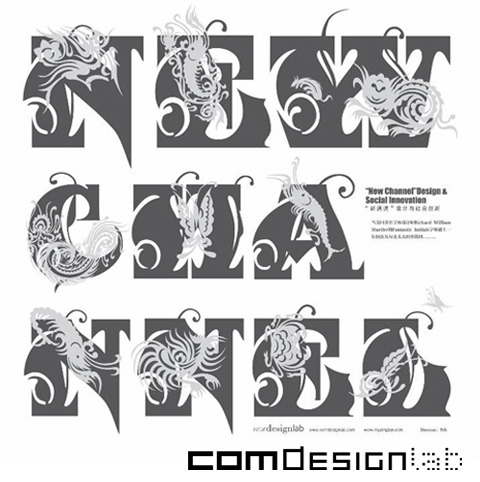
Comdesignlab Joins “Next Design” Exhibition
十月 , 12th , 2009 -- 10 : 38 上午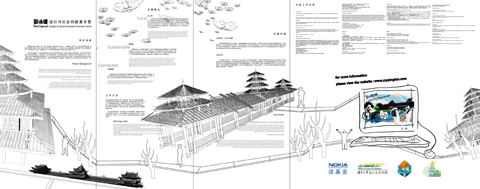
“New Channel design & social innovation summer camp”, a project held by Comdesignlab joins the exhibition of “Next Design”. It will be open from 15th to 20th October, in No. 800 Changde Road in Shanghai.
What is Next Design? Will it be high-tech? Will it be futurism? Or will it be the return of craftsmanship? DESIS (Design for Social Innovation & Sustainability)gives the answer by taking action: Next Design is all about social innovation and sustainability!
http://dolcn.com/data/cns_1/news_21/conference_212/cgen_2129/2009-10/1255156065.html
“新通道”设计与社会创新夏令营正式启动
七月 , 8th , 2009 -- 11 : 34 下午
2009年7月8日,由湖南大学设计艺术研究院主办,诺基亚北京研究院、DESIS社会创新和可持续设计联盟共同参与的“新通道”设计与社会创新夏令营正式开营。
来自湖南大学设计艺术学院季铁教授、袁翔、胡莹老师,建筑院焦胜、陈晓明老师,诺基亚研究中心王魏博士,以及湖南大学、浙江工业大学各院系二十六名学生参与了此次启动仪式。会上,季铁教授首先针对此次项目目标、计划内容及行程安排做了简要介绍,王魏博士就参与此次活动发表了感言,随后参与同学根据自己的兴趣点做了读书报告的演讲。


